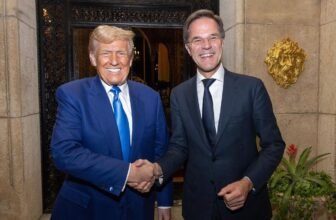
Trump’s Comments and Their Impact
Former U.S. President Donald Trump recently referred to Ukrainian President Volodymyr Zelenskyy as a “dictator without elections”, further stating that Ukraine should quickly negotiate with Russia to end the ongoing war. Trump also inaccurately claimed that Zelenskyy’s approval ratings were as low as 4%. These statements have sparked widespread condemnation and heightened diplomatic tensions between the United States and Ukraine.
Ukrainian Response: Strong Support for Zelenskyy
Despite the hardships of war, 57% of Ukrainians continue to trust President Zelenskyy, according to recent polls. Under the Ukrainian constitution, elections are prohibited during martial law, a measure unanimously supported by all parliamentary parties to ensure national stability during wartime.
Ukrainian citizens and officials have denounced Trump’s remarks, interpreting them as a tacit endorsement of Russian aggression and a direct attack on Ukraine’s resistance and defense efforts.
International Reactions: European Leaders Back Ukraine
Leading European figures have reinforced their commitment to support Ukraine. French President Emmanuel Macron and UK Prime Minister Keir Starmer reaffirmed their stance that Ukraine’s sovereignty must be upheld, strongly condemning any rhetoric undermining Ukraine’s leadership. Their statements underscore a broader Western commitment to standing against Russian aggression and supporting Ukraine’s fight for independence.
Russia’s Reaction: Moscow Welcomes Trump’s Remarks
Conversely, Russian officials have praised Trump’s statements. Dmitry Medvedev and Sergey Lavrov publicly applauded Trump’s position, noting that he aligned with Moscow’s perspective, particularly regarding NATO’s influence in the region. This reaction highlights the geopolitical complexities that continue to shape the conflict.
Ongoing Diplomatic Efforts: Excluding Ukraine?
Amid these tensions, the Trump administration has engaged in direct negotiations with Russia, reportedly excluding Ukraine and European allies from initial discussions. This has raised alarms among Western diplomats and Ukrainian officials, who fear that such an approach could weaken international support for Ukraine or lead to concessions favoring Russia.
Ukrainian officials have stressed that no peace agreement should be made without Ukraine’s direct involvement, reinforcing the principle that any decisions about Ukraine must include Ukrainian leadership.
FAQ: Key Questions on the Situation
Q: Why did President Trump call President Zelenskyy a “dictator without elections”?
A: Trump criticized Zelenskyy for not holding elections, despite the fact that Ukrainian law suspends elections during martial law to maintain national security.
Q: What is President Zelenskyy’s current approval rating?
A: Recent polls show that 57% of Ukrainians trust Zelenskyy, indicating strong public support despite the prolonged war.
Q: How have international leaders reacted to Trump’s remarks?
A: European leaders, including Macron and Starmer, reaffirmed their support for Ukraine and denounced any narratives that weaken Ukraine’s leadership.
Q: How has Russia responded to Trump’s statements?
A: Russian officials welcomed Trump’s remarks, seeing them as aligned with Moscow’s stance on the conflict.
Q: Is Ukraine still negotiating for peace?
A: The Trump administration has begun direct talks with Russia, excluding Ukraine and European allies from initial discussions. Ukrainian officials have insisted on being involved in all peace negotiations.
The situation continues to evolve, with Ukrainians showing steadfast support for their leadership despite external pressures. The global community closely monitors these developments, emphasizing the need for inclusive and transparent diplomatic resolutions.
💬 What are your thoughts on this ongoing situation? Share your perspective in the comments below!






